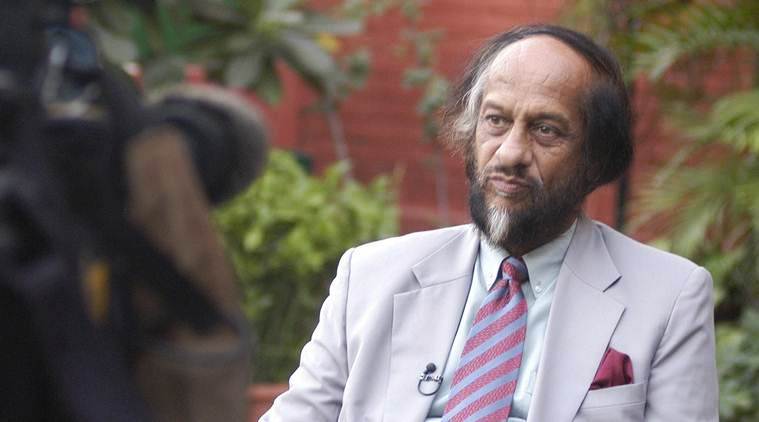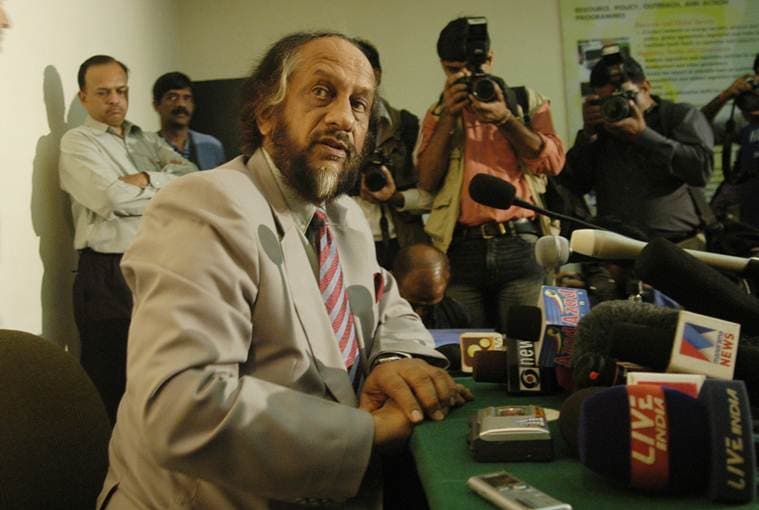 R K Pauchari (1940-2020)
R K Pauchari (1940-2020)
R K Pachauri, once the face of global fight against climate change, died after prolonged illness on Thursday, The Energy and Resources Institute (TERI), which he headed for over three decades, said in a statement. He was 80.
Pachauri was two-time chairman of the Intergovernmental Panel on Climate Change (IPCC), the global body of scientists which periodically produces the most comprehensive assessment of the science on climate change. The IPCC won the Nobel Peace Prize in 2007 during Pachauri’s chairmanship.
But he had to step down from that office in disgrace in February 2015 after a junior colleague at TERI accused him of sexual harassment. That case, still in court, virtually grounded the high-flying Pachauri who, at the peak of his career, used to move around with heads of states, business tycoons and other global celebrities.
READ | Who was RK Pachauri?
After the complaint, Pachauri not just lost his position at IPCC but also had to step aside from TERI, an organisation he had built and nurtured for almost three-and-a-half decades.
In a statement, his family said Pachauri underwent a major heart surgery before succumbing to his deteriorating health on Thursday. He was admitted to Escorts Heart Institute here on Tuesday. He died around 8.30 pm at his residence in Delhi.
“All of us in the TERI family stand with Dr Pachauri’s family in this hour of grief. TERI is what it is because of Dr Pachauri’s untiring perseverance. He played a pivotal role in growing this institution, and making it a premier global organisation in the sustainability space,” Ajay Mathur, present director-general of TERI, said in an email sent to all staff at TERI.
A railway engineer by training, Pachauri was the most recognised face of global campaign on climate change for over a decade when he headed IPCC, the only one holding the post for two terms. He spoke fervently, travelled almost non-stop, networked with global leaders, and campaigned tirelessly for the climate cause.
 In 1982, Pachauri founded The Energy and Resources Institute (TERI), an independent not-for-profit research institute focused on energy, environment and sustainable development.
In 1982, Pachauri founded The Energy and Resources Institute (TERI), an independent not-for-profit research institute focused on energy, environment and sustainable development.
In 2002, he was an unexpected choice to become the chairman of IPCC, which was earlier headed by two outstanding atmospheric scientists of global renown — Bert Bolin and Robert Watson. Pachauri had earned a name for himself through the work that TERI had been doing under his charge. Starting almost from scratch in 1982, he made TERI a globally recognised organisation working in the field of environment, energy and sustainability.
Pachauri also strongly influenced India’s domestic climate policy during those years, serving as a member of the Prime Minister’s Council on Climate Change, constituted in 2007. India’s National Action Plan on Climate Change, announced in 2008, was finalised under his advice.
His crowning glory came in 2007 when IPCC was awarded the Nobel Peace Prize for raising awareness on climate change through its Fourth Assessment Report, which was the most comprehensive scientific assessment of climate change at the time. The IPCC shared the prize with former US Vice President Al Gore.
Pachauri, as head of IPCC, received the Nobel Prize on behalf of his organisation. He was also awarded the Padma Vibhushan, India’s second highest civilian honour. But he also had to deal with several controversies, most notable of which emerged when some statements in the fourth assessment report were found to have been based on claims that had not undergone robust scientific peer-review.
A sexual harassment allegation, brought by a junior associate at TERI, brought an ignominious end to Pachauri’s glittering career. Almost forced to resign from IPCC, he tried desperately to retain his hold over TERI, but in vain. Once an extremely visible figure, Pachauri withdrew from public space, almost going into a hiding.
Pachauri was born on August 20, 1940, in Nainital, Uttarakhand, and studied at La Martiniere College in Lucknow and at the Indian Railways Institute of Mechanical and Electrical Engineering in Jamalpur, Bihar.